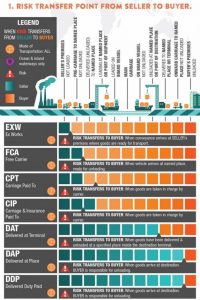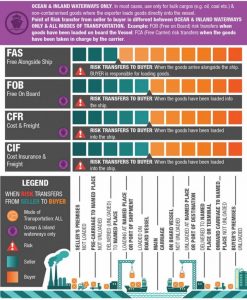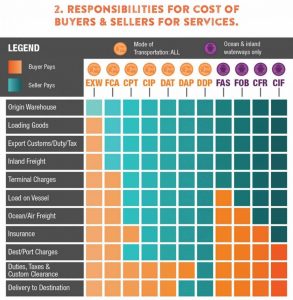Incoterms – International Commercial Terms



Incoterms ® 2020
Incoterms (Official name “Incoterms ® 2020″) is the global standard for international trade and stands for International Commercial Terms. These conditions concern the responsibility for the goods of both the buyer and the seller at different stages of the transportation process. Incoterms are accepted worldwide and used by governments, legal authorities, and traders in international commercial transactions. You should determine the appropriate incoterm depending on your business needs and your supplier.
EXW (EXWorks)
One of the simplest and most basic shipment arrangements places the minimum responsibility on the seller with greater responsibility on the buyer. In an EXWorks transaction, the seller delivers when it places the goods at the disposal of the buyer at the seller’s location or at another specified place. The seller does not need to load the goods on any collecting vehicle, nor does it need to clear the goods for export. The buyer is responsible for making arrangements with their forwarder for insurance, export clearance and handling all other paperwork.
FCA (Free Carrier)
In this type of transaction, the seller delivers the goods to the carrier or another person nominated by the buyer at the seller’s location or another named place. “Delivery” is accomplished at a predetermined port or destination point and the buyer is responsible for insurance.
FAS (Free Alongside Ship)†
The seller delivers when the goods are placed alongside the vessel nominated by the buyer at the named port of shipment. The risk of loss of or damage to goods passes when the goods are alongside the ship, and the buyer bears all costs from that moment onward.
FOB (Free On Board)†
The seller delivers the goods on board the vessel nominated by the buyer at the named port of shipment or procures the goods already so delivered. The buyer’s responsibility for insurance and transportation begins at the same moment.
CFR (Cost and Freight)†
The seller delivers the goods on board the vessel or procures the goods already so delivered. The risk of loss of or damage to the goods passes when the products are on board the vessel. The seller must contract for and pay the costs and freight necessary to bring the goods to the named port of destination.
CIF (Cost, Insurance and Freight)†
This arrangement similar to CFR, but instead of the buyer insuring the goods for the maritime phase of the voyage, the shipper/seller will insure the merchandise. In this arrangement, the seller usually chooses the forwarder. The seller delivers the goods on board the vessel or procures the goods already so delivered. The risk of loss of or damage to the goods passes when the products are on the ship.
CPT (Carriage Paid To)
The seller delivers the goods to the carrier or another person nominated by the seller at an agreed place (if any such site is agreed between parties). In addition the seller must buy cargo insurance, naming the buyer as the insured while the goods are in transit.
CIP (Carriage and Insurance Paid To)
This term is primarily used for multimodal transport. Because it relies on the carrier’s insurance, the shipper/seller is only required to purchase minimum coverage. When this particular agreement is in force, Freight Forwarders often act in effect, as carriers. The buyer’s insurance is effective when the goods are turned over to the Forwarder.
DAT (Delivered At Terminal) aka DPU (Delivered at Place Unloaded)
The shipper/seller pays for carriage to the terminal, except for costs related to import clearance, and assumes all risks up to the point that the goods are unloaded at the destination terminal.
DAP (Delivered At Place)
The shipper/seller pays for carriage to the named place, except for costs related to import clearance, and assumes all risks prior to the point that the goods are ready for unloading by the buyer.
DDP (Delivered Duty Paid)
DDP term tend to be used in intermodal or courier-type shipments. Whereby, the shipper/seller is responsible for dealing with all the tasks involved in moving goods from the manufacturing plant to the buyer/consignee’s door. It is the shipper/seller’s responsibility to insure the goods and absorb all costs and risks including the payment of duty and fees.
†Ocean & inland waterways only


